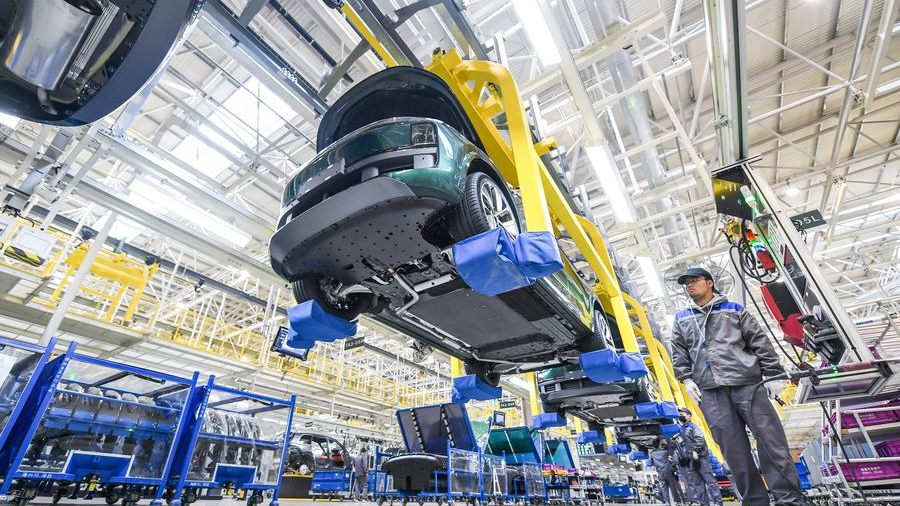Published: August 12,2024
By Lu Jianfei

Inside the factory of Chinese electric vehicle maker Li Auto in Changzhou, east China’s Jiangsu Province, February 15, 2023./Xinhua
On July 4, the European Commission imposed provisional additional tariffs of up to 37.6 percent on Chinese electric vehicle (EV) makers. In response, China filed an appeal with the World Trade Organization on August 9, challenging the extra duties, viewing them as detrimental to the development of the global EV industry and green transformation cooperation.
As China’s EV sector advances in battery technology and software development, and leverages the vast domestic market, how to deal with the rising industry rationally has become the European Union’s new concern.
In recent years, China’s EV industry is leading the sector, thanks to its mastery of core battery technologies, an extensive manufacturing chain and past supportive industrial policies.
Take the manufacturing chain for instance. Chinese EV companies have forged comprehensive strategic partnerships with major automakers. BYD, a leading Chinese EV company, signed an agreement with Toyota in 2019 to set up a battery research and development venture. BYD is also collaborating with Foshan Plastics Group for building electronic sensors for light detection and control. Such critical collaborations have enabled Chinese EV companies to establish an industry ecosystem and accelerated the development of China’s EV industry.
According to the Global EV Outlook 2024 by the International Energy Agency, in 2023, over 50 percent of all electric cars sold worldwide were produced by Chinese automakers, who accounted for just 10 percent of global internal combustion engines car sales. The same year, China exported over 4 million cars, making it the world’s largest auto exporter. Of these cars, 1.2 million were EVs, marking a nearly 65 percent increase in overall car exports and an 80 percent rise in EV exports compared to 2022.
Europe is a key export market. Over 19 percent of all electric cars sold across the EU in 2023 were made in China. But notably, more than half of these were from Western carmakers, with 28 percent imported by Tesla and 20 percent by Renault’s Dacia. Chinese brands accounted for only 7.9 percent.
The rapid development of China’s EV industry has accelerated the global energy transition. By 2030, one in three cars on Chinese roads will be electric, while it will be one in five in both the U.S. and the EU, according to the outlook. This shift could reduce oil demand by 6 million barrels per day, equivalent to current U.S. road transport consumption. The global consensus is clear: Accelerated green energy development is crucial for decarbonization, and China’s affordable EV technology is a vital contributor to this effort.
Moreover, China’s EV industry brings innovative technology and manufacturing to the global automobile industry. Their rapid product gestation, integrated supply chains, consumer-centered marketing and competitive pricing are changing the automotive market dynamics and reshaping the future of the global automobile industry.
The chassis of a BYD electric vehicle on display in Budapest, Hungary, October 17, 2023. /Xinhua
China’s EV companies are also speeding up their EU localization, benefiting the local market and employment. In December 2023, BYD announced its plan to construct a new manufacturing and production center in Hungary that will produce EVs and plug-in hybrids for the European market, and create thousands of local jobs.
Envision AESC, a Chinese EV battery maker, is building its lithium iron phosphate battery gigafactoryin Spain, investing over 1 billion euros in the first phase and creating 900 jobs. China’s Chery Auto has signed a joint venture deal with Spain’s EV Motors to produce cars later this year, generating approximately 1,600 direct jobs.
As Chinese President Xi Jinping stressed during his meeting with Italian Prime Minister Giorgia Meloni in Beijing on July 29, in a world of economic globalization, win-win development can be achieved only through openness and cooperation in global industrial and supply chains. China remains committed to peaceful development, never seeking hegemony, and is willing to share development opportunities with other countries.
Lu Jianfei, a special commentator on current affairs for CGTN, is a senior consultant at the State Grid Energy Research Institute and specializes in energy, state-owned enterprise reform and corporate governance. She holds a doctorate in management from Renmin University of China.
 Africa -China Review Africa -China Cooperation and Transformation
Africa -China Review Africa -China Cooperation and Transformation
